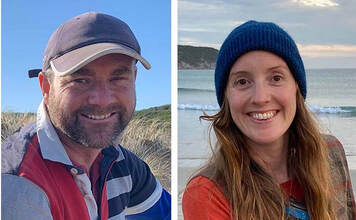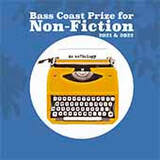 Award-winning authors Lucinda Bain and Rees Quilford will talk about the role of daydreaming in the creative process, writing as self-exploration, and the place of “I”.
Award-winning authors Lucinda Bain and Rees Quilford will talk about the role of daydreaming in the creative process, writing as self-exploration, and the place of “I”. By Catherine Watson
LIKE most people, I avoid articles, books and documentaries about climate change. Not that I’m a climate sceptic but I’ve got the gist. Why waste my limited intellectual and emotional energy on something I can’t change?
But what if I read this?
“In truth, the kind of life I lead with a houseful of young children can easily become monotonous. But at least once a year our domestic routine is interrupted by packing lists, camp gear and late night batch cooking and we find ourselves - my husband, three daughters and I – facing into the wind on the crisp shores of Norman Bay, our long shadows reaching into the earth, the oceanic air washing us clean of suburban tedium."
LIKE most people, I avoid articles, books and documentaries about climate change. Not that I’m a climate sceptic but I’ve got the gist. Why waste my limited intellectual and emotional energy on something I can’t change?
But what if I read this?
“In truth, the kind of life I lead with a houseful of young children can easily become monotonous. But at least once a year our domestic routine is interrupted by packing lists, camp gear and late night batch cooking and we find ourselves - my husband, three daughters and I – facing into the wind on the crisp shores of Norman Bay, our long shadows reaching into the earth, the oceanic air washing us clean of suburban tedium."
 Lucinda and Rees will also
Lucinda and Rees will alsolaunch the second Bass Coast
Prize for Non-Fiction anthology.
Copies will be on sale.
Certainly my climate change antennae aren’t quivering. This is the low-key start of Lucinda Bain’s essay The Prom, an intense and personal interrogation of a writer’s – and mother’s – place in nature in the midst of a climate emergency that won last year’s Bass Coast Prize for Non-Fiction.
It’s an oblique and low-key introduction to a work that shows how a writer can approach a daunting subject such as climate change or a pandemic and make it personal and intimate.
Lucinda and Rees Quilford, the 2021 Bass Coast Prize winner, will explore approaches to writing creative non-fiction as part of the Phillip Island Festival of Stories next Saturday, November 19.
Spark it Up: Writing Creative Non-Fiction is a free session in the Cowes Library, in the new Cowes Cultural Centre, Berninneit at 2.15pm. All are welcome.
Rees’s prize-winning story, Adrift in shallow waters, 92 days of winter swimming, walking and watching, documents his experience of returning to live in Bass Coast, the place of his birth and childhood in 2020, just as the pandemic exploded.
In a deliberate memory-making project at a time of great social upheaval, every day of that first arduous Covid winter, he dived into the bracing cold of Bass Strait, took a Polaroid photo, and documented his thoughts.
The two authors will be talking about what they have learned in their writing careers, the role of daydreaming in the creative process, writing as self-exploration, and the place of “I” – how much of yourself do you reveal in your writing?
For more information on the festival, visit www.pifestivalofstories.com. Tickets for other events are on sale at Trybooking.
Catherine Watson, a co-founder and former judge of the Bass Coast Prize for Non-Fiction, will be in conversation with the two authors.
It’s an oblique and low-key introduction to a work that shows how a writer can approach a daunting subject such as climate change or a pandemic and make it personal and intimate.
Lucinda and Rees Quilford, the 2021 Bass Coast Prize winner, will explore approaches to writing creative non-fiction as part of the Phillip Island Festival of Stories next Saturday, November 19.
Spark it Up: Writing Creative Non-Fiction is a free session in the Cowes Library, in the new Cowes Cultural Centre, Berninneit at 2.15pm. All are welcome.
Rees’s prize-winning story, Adrift in shallow waters, 92 days of winter swimming, walking and watching, documents his experience of returning to live in Bass Coast, the place of his birth and childhood in 2020, just as the pandemic exploded.
In a deliberate memory-making project at a time of great social upheaval, every day of that first arduous Covid winter, he dived into the bracing cold of Bass Strait, took a Polaroid photo, and documented his thoughts.
The two authors will be talking about what they have learned in their writing careers, the role of daydreaming in the creative process, writing as self-exploration, and the place of “I” – how much of yourself do you reveal in your writing?
For more information on the festival, visit www.pifestivalofstories.com. Tickets for other events are on sale at Trybooking.
Catherine Watson, a co-founder and former judge of the Bass Coast Prize for Non-Fiction, will be in conversation with the two authors.